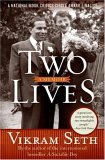Summary | Excerpt | Reading Guide | Reviews | Beyond the Book | Readalikes | Genres & Themes | Author Bio

1.2
I had been to England twice before. When I was two and a half
years old, I travelled by sea with an uncle and aunt who
happened
to be going there. I was to join my parents, who had left a year
or
so earlier: the Bata Shoe Company, for which my father worked,
had transferred him to head office in London. My widowed
grandmother – my mother's mother (whom I called Amma) – had
been left in charge of me at home, and I grew very attached to
her.
When I began to speak, Amma insisted that it be in Hindi and
only
in Hindi. She herself was perfectly bilingual, but had decided
that
I would get more than enough English in England. As a result,
when I was delivered to my parents in London, they found that I
couldn't speak or understand a word of the local language.
Shortly after my arrival, I was taken to see Shanti Uncle and
Aunty Henny. During the time my mother had been in England,
she had become very fond of Shanti Uncle, and he of her. Both
Aunty Henny and he were keen on children, and were looking
forward
eagerly to my arrival.
I don't know whether it was Shanti Uncle's effusiveness or Aunty
Henny's European colour and features, but I quickly became
uncomfortable. 'I don't like it here, I want to go home,' I stated firmly in
Hindi. Shanti Uncle looked startled. When Aunty Henny asked him
what I'd said, he told her that I was enjoying myself and would
come again, but that I was tired and needed to go home and rest.
The foreign Aunty Henny, whatever she represented to me, did
pose a puzzle to the whole of Shanti Uncle's extended family in
India. Uncle had married late, in his forties, and had not
brought
her to India to be shown around in the proper way. They had no
children. She was known to be a German, tall, quite brusque, and
with no time for clan commitments in the Indian style. As Aunty
Henny said, years later: 'It's very difficult to be enthusiastic
about
all these adults, these total strangers, who turn up every so
often
and call themselves your nieces and nephews.' Even my mother,
whom Aunty Henny liked, never graduated to being her niece.
Whenever my parents called, she would open the door, survey the
visitors standing on the top step and shout out, in a
view-halloo
sort of voice, 'Shanti, your relations are here.'
After a year and a half, I was sent back to Calcutta with my
grandmother, who had suddenly and unexpectedly arrived in
London on a chartered flight. My parents remained in England for
another year. When they returned to Calcutta, my baby brother Shantum was with them.
My second visit to England took place when I was nine, and
lasted only a month. One memory of that visit was of Jackie, the
plump and pretty au pair at 18 Queens Road, who was very
huggable
and on whom I had a crush.
But the event of which my memory is strongest, and perhaps has
grown even stronger over time, took place at one of the bridge
parties
that Shanti Uncle and Aunty Henny used to hold from time to
time on a Saturday evening. Shanti Uncle took his bridge very
seriously,
and my father had made a folding leather stand for him so
that he could arrange his cards conveniently and play with his
left
hand. I was bored with watching this strange, intense game,
which
consisted of almost complete silence followed by
incomprehensible,
even acrimonious, volubility. It was late. I was leafing through
a
pile of magazines in another room. One of them – I think it was
Life – contained an
illustrated article about Adolf Eichmann. I
cannot now remember much about it, but it must have covered his
crimes, his capture and his trial. At one stage, either at a
break in
the game or while she was dummy, Aunty Henny stepped into the
room, saw what I was reading, and said to me, 'So, Vicky, what
do
you think of him?' My reply was that he was an evil, horrible
man. This seemed a natural enough reaction, but it had a strong
effect on Aunty Henny. 'You think so? You think so?' she said,
and
looked at me searchingly. But instead of discussing matters
further,
she left the room and I went back to my reading.
Visit HarperCollins.com for more information about Two Lives by Vikram Seth. The foregoing is excerpted from Two Lives by Vikram Seth. All rights reserved. No part of this book may be used or reproduced without written permission from HarperCollins Publishers, 10 East 53rd Street, New York, NY 10022.
Your guide toexceptional books
BookBrowse seeks out and recommends the best in contemporary fiction and nonfiction—books that not only engage and entertain but also deepen our understanding of ourselves and the world around us.